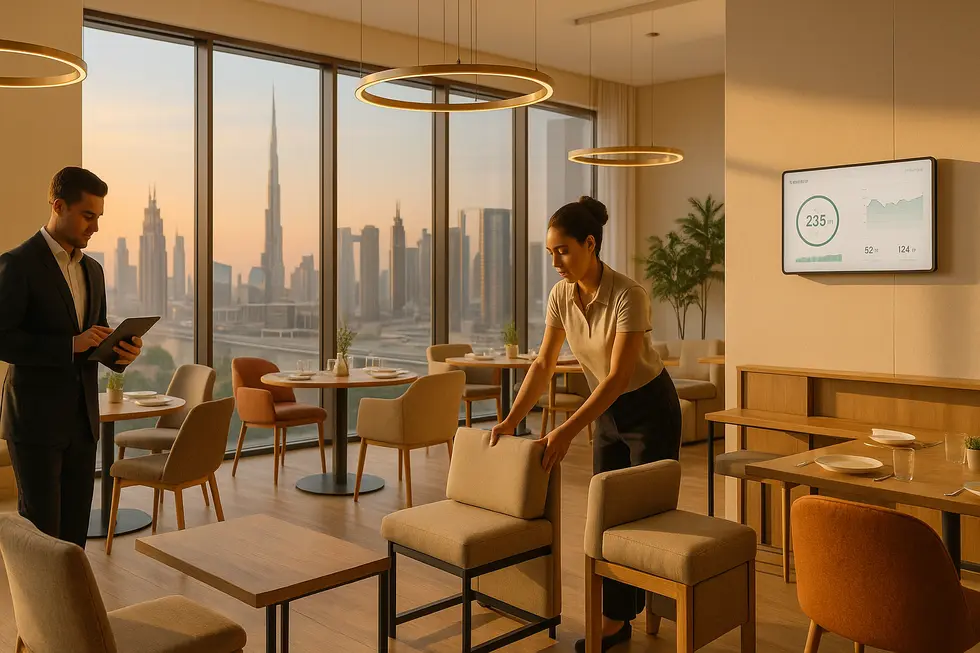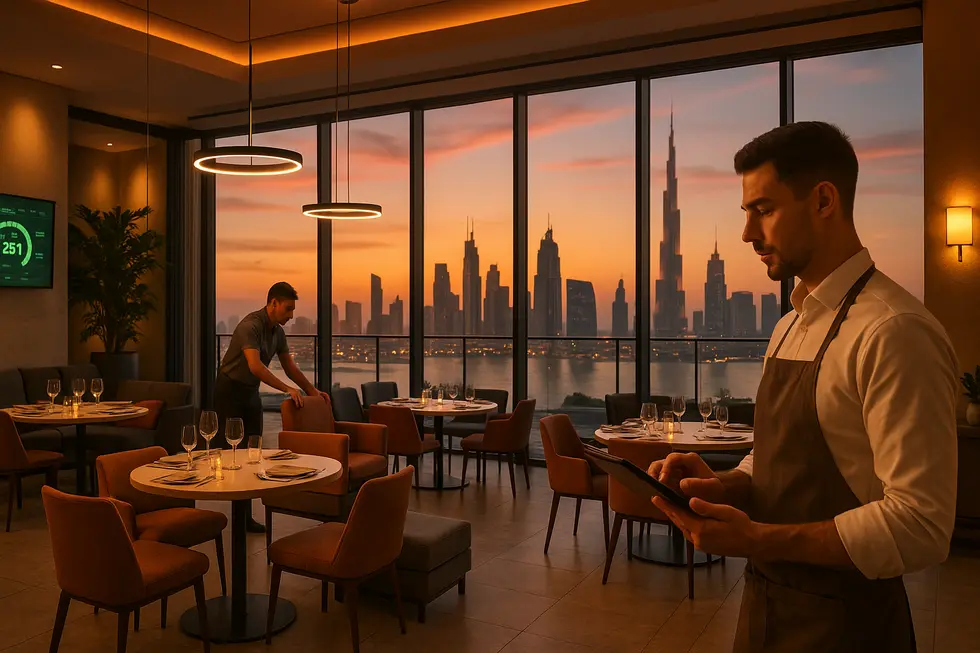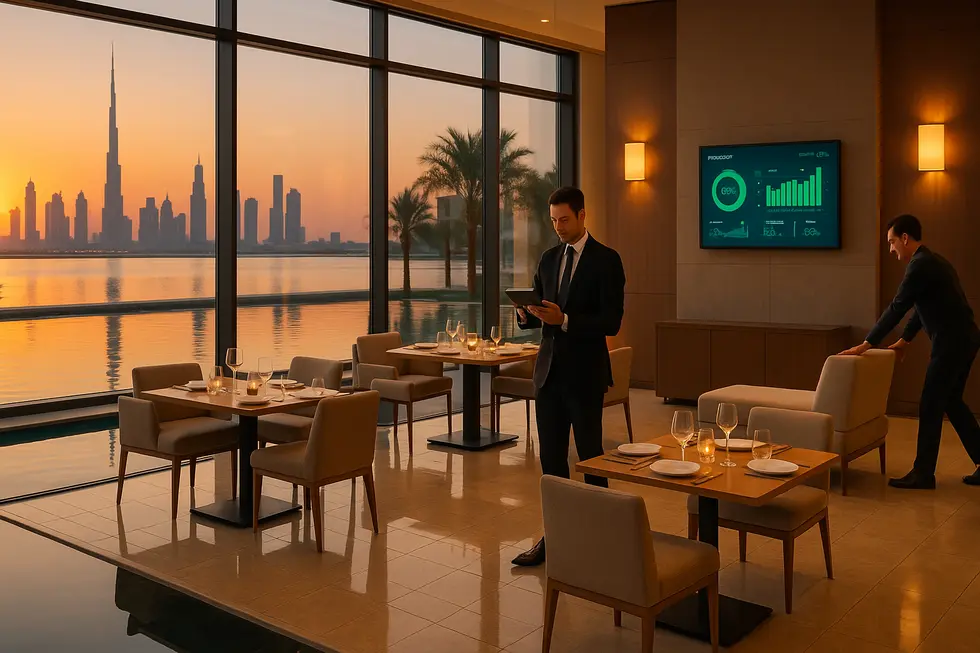Operational Design: Elevating Dubai Hotel Restaurant Guest Experience
Apply operational design Dubai hotel restaurant guest experience improvements with smart tech, flexible spaces, and team alignment.
Customer Loyalty & Guest Experience
Orchestrating Delight: Smart Technology, Flexible Spaces and Design Thinking in Dubai Hotel Restaurants
 Operational design shapes every guest touchpoint, transforming a meal into a memorable moment. In Dubai hotel restaurants, operational design must combine smart technology, adaptable spatial layouts, and design thinking to meet elevated expectations. Smart systems reduce friction. Contactless ordering, IoT-enabled environmental controls, and biometric access speed service and let guests set mood, lighting, and temperature with ease. These adjustments create a personalized atmosphere without adding labor complexity. When systems share data across departments, the front desk, kitchen, and floor teams anticipate needs and act with confidence.
Operational design shapes every guest touchpoint, transforming a meal into a memorable moment. In Dubai hotel restaurants, operational design must combine smart technology, adaptable spatial layouts, and design thinking to meet elevated expectations. Smart systems reduce friction. Contactless ordering, IoT-enabled environmental controls, and biometric access speed service and let guests set mood, lighting, and temperature with ease. These adjustments create a personalized atmosphere without adding labor complexity. When systems share data across departments, the front desk, kitchen, and floor teams anticipate needs and act with confidence.
Flexible spaces multiply value and reduce waste. A dining room that converts into a private meeting area or late-night lounge extends service windows. Furniture that stacks or reconfigures, modular partitions, and integrated service zones preserve circulation and sightlines. Thoughtful flow planning prevents congestion at peak times and improves staff movement. As a result, team members spend less time navigating obstacles and more time delivering care. Flexible design also supports themed experiences that align with cultural occasions and business events common in Dubai.
Design thinking brings guest empathy into operational decisions. Observing guest behavior, prototyping seating arrangements, and iterating on service scripts reveal small frictions that affect satisfaction. Visual identity is not merely decorative; it signals consistency and reassures guests. Ambient lighting, natural materials, and acoustics work together to create a coherent emotional experience. Every operational choice should answer: does this improve guest comfort without undermining efficiency?
Sustainability and leadership are integral. Energy-efficient lighting, water-saving fixtures, and durable finishes lower costs and appeal to eco-aware guests. Strong operational leadership invests in continuous staff training and cross-department coordination. Teams that rehearse transitions between breakfast, lunch, and event setups reduce downtime. Clear role definitions and shared digital dashboards keep everyone aligned.
When these elements converge, the guest experience becomes seamless. Technology personalizes, flexible spaces adapt, and design thinking ensures relevance. The operational outcome is measurable: reduced wait times, higher table turnover without rush, improved guest satisfaction scores, and stronger loyalty. For practical ideas on how interior identity supports these gains, see this piece on restaurant branding in Dubai.
Further reading on hotel operations and how coordination drives guest experience is available from industry research: https://hospitalityinsights.ehl.edu/hotel-operations
Synchronizing Service Excellence: Leadership, Training and Cross-Department Coordination in Dubai Hotel Restaurants
 Operational coordination, staff training, and leadership shape the restaurant guest experience in Dubai more than any single design element. When operational design focuses on these human systems, restaurants achieve a fluid service rhythm that guests perceive as effortless. Coordinating front office, kitchen, housekeeping, maintenance, and third-party vendors turns discrete tasks into a seamless guest journey. Clear role definitions and shared protocols reduce handoff friction. Real-time communication tools align teams during peak periods. This lowers wait times and prevents service breakdowns.
Operational coordination, staff training, and leadership shape the restaurant guest experience in Dubai more than any single design element. When operational design focuses on these human systems, restaurants achieve a fluid service rhythm that guests perceive as effortless. Coordinating front office, kitchen, housekeeping, maintenance, and third-party vendors turns discrete tasks into a seamless guest journey. Clear role definitions and shared protocols reduce handoff friction. Real-time communication tools align teams during peak periods. This lowers wait times and prevents service breakdowns.
Training programs reinforce that coordination by building consistent skills and cultural awareness. Staff learn technical tasks and develop soft skills like situational empathy and anticipatory service. Continuous learning formats—short, scenario-based modules and on-the-job coaching—allow teams to adapt without long service interruptions. Cross-training familiarizes employees with neighboring functions. A server who understands kitchen timing can manage guest expectations better. Housekeeping awareness of venue schedules avoids conflicts. These small competencies compound into a stable dining experience.
Leadership is the connective tissue. Strong leaders set clear standards and model calm execution. They translate guest expectations into measurable routines. Leaders also steward feedback loops, turning guest comments into rapid operational tweaks. Empowered supervisors intervene early when anomalies arise. They keep morale high and reduce staff turnover, which preserves institutional knowledge and service consistency. Leadership that values transparency creates accountability and encourages innovation among frontline staff.
Restaurant interior design complements people-led systems. Layouts that optimize kitchen-to-table flow reduce unnecessary movement. Thoughtful seating arrangements balance privacy with visibility for efficient service. When space supports staff workflows, training and leadership interventions magnify their effects. Operational design thus blends physical and human elements toward the same end.
In practice, operational excellence is iterative. Pilot new coordination protocols, gather staff feedback, and refine procedures rapidly. Use performance metrics that matter to guests: wait times, order accuracy, and perceived attentiveness. Link rewards to team outcomes, not individual metrics alone. This aligns incentives and sustains collaboration.
Operational design that fuses coordination, training, and leadership transforms service from competent to memorable. In Dubai’s competitive hospitality market, this approach elevates guest satisfaction and builds repeat business. For ideas on fostering guest loyalty through food and beverage programs, see F&B build guest loyalty. For operational guidance specific to Dubai hotels, consult Mudras Hospitality: https://www.mudrashospitality.com/copy-of-dubai
Sustainable Operational Design: Eleving Guest Experience and Market Edge in Dubai Hotel Restaurants
 Sustainable Operational Design: Eleving Guest Experience and Market Edge in Dubai Hotel Restaurants
Sustainable Operational Design: Eleving Guest Experience and Market Edge in Dubai Hotel Restaurants
Operational design that embeds sustainability reshapes how guests perceive hotel restaurants. When waste reduction, responsible sourcing, and staff training become daily practice, the dining experience feels authentic and purposeful. Guests notice when menus reflect local producers, when portioning minimizes plate waste, and when service teams can explain the story behind each ingredient. Those moments create emotional value and build trust.
Designing for sustainability begins with mapping the guest journey and identifying friction points where resource use can be reduced. Simple operational changes—smarter inventory systems, batch-cooking for events, and clarifying portion sizes—cut food waste and lower costs. Facilities design complements these shifts with energy-efficient lighting, water-saving fixtures, and compact layouts that allow staff to serve more efficiently. These practical upgrades improve comfort and signal a commitment to environmental stewardship.
Staff are central to this transformation. Training that pairs operational procedures with storytelling empowers teams to translate policies into guest-facing moments. When servers can talk about supplier relationships or waste diversion programs, sustainability stops feeling like a back-office initiative. Leadership that measures outcomes and rewards sustainable practices keeps momentum alive and aligns daily routines with strategic goals.
Embedding sustainability into brand identity strengthens competitive positioning. Hotels that showcase circular practices on menus and in marketing report higher guest satisfaction and longer stays. Loyalty programs that reward eco-conscious choices—such as opting out of daily linen changes or choosing plant-based meals—turn sustainable behavior into repeatable habits. Over time, these programs improve review scores and distinguish properties in a crowded market.
Operational design also opens pathways to circular economy models. Closed-loop systems for food production, composting, and energy recovery reduce reliance on external inputs and protect margins. These systems require cross-department coordination and robust data to scale, but they deliver measurable ESG benefits and operational resilience.
A cohesive, sustainable operational design aligns guest expectations with environmental goals, while protecting profitability. It converts regulatory and municipal targets into tangible guest experiences. For practical guidance on integrating sustainability into hospitality operations, explore restaurant branding case studies on restaurant branding in Dubai. For broader context, see this sector overview: https://ollengroup.com/en/insights/article/sustainable-hospitality-uae-guest-experience
Final thoughts
Operational design is the strategic bridge between guest expectations and everyday service delivery in Dubai hotel restaurants. By combining smart technology, flexible space planning, design thinking, rigorous cross-department coordination, targeted staff development, and pragmatic sustainability measures, 4-star properties can create dining experiences that are faster, more personal, and more profitable. Implementation does not require wholesale renovation; it requires focused pilots, clear KPIs, and leaders willing to iterate. The outcome is a restaurant that consistently delights guests, reduces operating friction, and stands out in Dubai's competitive hospitality landscape. Let’s design a guest journey theyll never forget - start the conversation now.
About us
Markus Mensch is a strategic marketing consultancy specializing in hospitality and F&B brands, with offices in Dubai and Germany. Since 2007, the company has supported over 1,000 businesses in increasing visibility, guest loyalty, and revenue - without relying on paid ads. With the proprietary OBC-Strategie®, Markus Mensch and his team provide structured, result-oriented solutions tailored to 4-star hotels and restaurants. The company combines marketing expertise, industry experience, and hands-on implementation to help clients achieve sustainable growth. Made in Germany - Built for Dubai
Transform Your Hospitality Business Today
Are you ready to boost your revenue and enhance guest loyalty? Let's get started!

